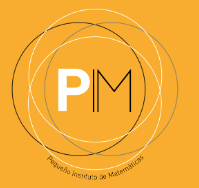Investigación
Noticias Destacadas
 Agenda del Departamento Agenda del Departamento |
- Información (provisional) sobre grupos y horarios de las asignaturas impartidas por el Departamento de Matemáticas, para el curso 2023-2024.
- Propuestas de Trabajos de Fin de Grado para el curso 2023-2024.
|
Canal @matematicasuamEnlace al canal del Departamento en youtube. |
PIM (Pequeño Instituto de Matemáticas)Con el objetivo de fomentar el interés por las matemáticas y dirigido a jóvenes entre 14 y 18 años, nace este proyecto de Instituto de Ciencias Matemáticas (ICMAT) en colaboración con nuestro Departamento, la Universidad Autónoma de Madrid y la Real Sociedad Matemática Española. El proyecto comienzó en el curso académico 2022-2023. Ampliar información en su página web. |
Jornada de primavera en EDPs. Viernes, 9 de abril de 2021, 10h- 11:25h
Enlace: https://conectaha.csic.es/b/mar-e3k-scr-8wi
Title: Inverse-design problem for Hamilton-Jacobi equations, backward-forward viscosity solutions and semiconcave envelopes.
Abstract: In this talk, we will consider the inverse problem of identifying the initial condition from a given solution at some positive time for evolutionary Hamilton-Jacobi equations. First of all, we will address the issue of describing the reachable set, i.e. the set of functions for which there exists at least a compatible initial condition. Secondly, we will discuss the possibility of having multiple initial conditions compatible with the given function, and we will give a way of characterizing all of them. Finally, for any given Lipschitz function, we will analyze the function obtained after solving the Hamilton-Jacobi equation backward and then forward in time. This function, which can be seen as a projection onto the reachable set, turns out to be the viscosity solution of an elliptic obstacle problem, and we refer to it as the semiconcave envelope.
Referencia:
Esteve C., Zuazua E.,The inverse problem for Hamilton-Jacobi equations and semiconcave envelopes, SIAM J. Math. Anal., Vol. 52, No. 6, pp. 5627–5657 (2020). https://doi.org/10.1137/20M1330130
Segundo Ponente: Jon Asier Bárcena (UAM) 10:45h- 11:25h
Title: Cost of null controllability for parabolic equations with vanishing viscosity
Abstract: The transport-diffusion equation with vanishing diffusivity describes the dynamics
of physical and biological phenomena in which the transport dynamics dominates the
diffusive dynamics. Since these systems are of parabolic nature, it is well-known that
they are null controllable. However, there are many open questions on the asymptotic
behaviour of the cost of null contrallability when the diffusion parameter vanishes.
In this talk we study the transport-diffusion equation with Neumann, Robin and mixed
boundary conditions. The main results concern the behaviour of the cost of the null
controllability when the diffusivity vanishes and the control acts in the interior. First, we
prove that if we almost have Dirichlet boundary conditions in the part of the boundary
in which the flux of the transport enters, the cost of the controllability decays for a time
T sufficiently large. Next, we show some examples of Neumann and mixed boundary
conditions in which for any time T>0 the cost explodes exponentially. Finally, we study
the cost of the problem with Neumann boundary conditions when the control is localized
in the whole domain.






